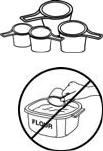
6
• Spoon the dry ingredients into the appropriate measuring cups or
spoons, and then level off with table knife. All ingredients measured
in measuring spoons and cups must be level, not rounded or
heaping.
• Never scoop measuring cups into dry ingredients. This will compress
the ingredients into the cup and cause the dough to be dry which will
result in a short loaf of bread.
BREAD FLOUR should be used in your bread maker. It contains more gluten-
forming proteins than all-purpose flour and will provide well-formed loaves with good
structure. Several different brands of bread flour are available. Do not use self-
rising or cake flour in your bread maker.
WHOLE WHEAT FLOUR can be used in your bread maker using the
“WHOLEWHEAT” bread setting. Whole wheat flour contains the entire wheat kernel,
including the bran and germ. Therefore, breads made with 100 percent or a high
percentage of whole wheat flour will be lower in height and heavier in texture than
bread made with bread flour. The “WHOLEWHEAT” setting on your bread maker is
programmed to better develop the structure of wheat breads for optimum results.
RYE FLOUR can be used in combination with bread flour in the preparation of rye or
pumpernickel bread. However, it cannot be used alone as it does not contain enough
protein to develop adequate gluten for structure.
SUGAR and OTHER SWEETENERS provide food for the yeast, add height and
flavor to the bread and give the crust a golden color. Types of sweeteners that can
be used include sugar, brown sugar, honey, molasses, maple syrup, corn syrup and
fruits, dried or fresh. Do not use artificial sweeteners as a substitute for sugars and
other natural sweeteners; the yeast will not react properly and poor results will be
attained. When measuring sticky sweeteners, such as honey, coat the measuring
spoon with vegetable oil before measuring the sweetener. This will allow the
sweetener to slide off the spoon without sticking.
MILK enhances flavor and increases the nutritional value of bread. Any type of milk;
dry, whole, 2%, 1%, skim, buttermilk or canned evaporated milk can be used in
making bread. Refrigerated milk may be warmed to 80-90°F (27-32°C) however do
not overheat (above 100°F, 38°C) as this could affect the yeast activity. Do not use
regular milk when using the “Delay Start” function. Use dry milk and water as a
substitute.
WATER used in combination with dry milk can be substituted for regular milk and
must be used when using the “Delay Start” function as regular milk can spoil when
left at room temperature for several hours. Use lukewarm water, about 80-90°F (27-
32°C). Do not use water above 100°F (38°C) as this could affect the yeast.
BUTTER, MARGARINE, SHORTENING and OILS serve several purposes in bread
making as they tenderize the bread, add flavor and richness. Butter and margarine
are interchangeable in recipes. Butter and margarine can be used right from the
refrigerator. Cut cold butter or margarine into smaller pieces for faster blending
during the knead cycle. Low-fat or fat-free bread can be made by substituting equal
amounts of unsweetened applesauce or plain yogurt for the amount of fat
recommended in the recipe. Using less fat will affect the height, tenderness and
texture of the bread, which is normal.


















